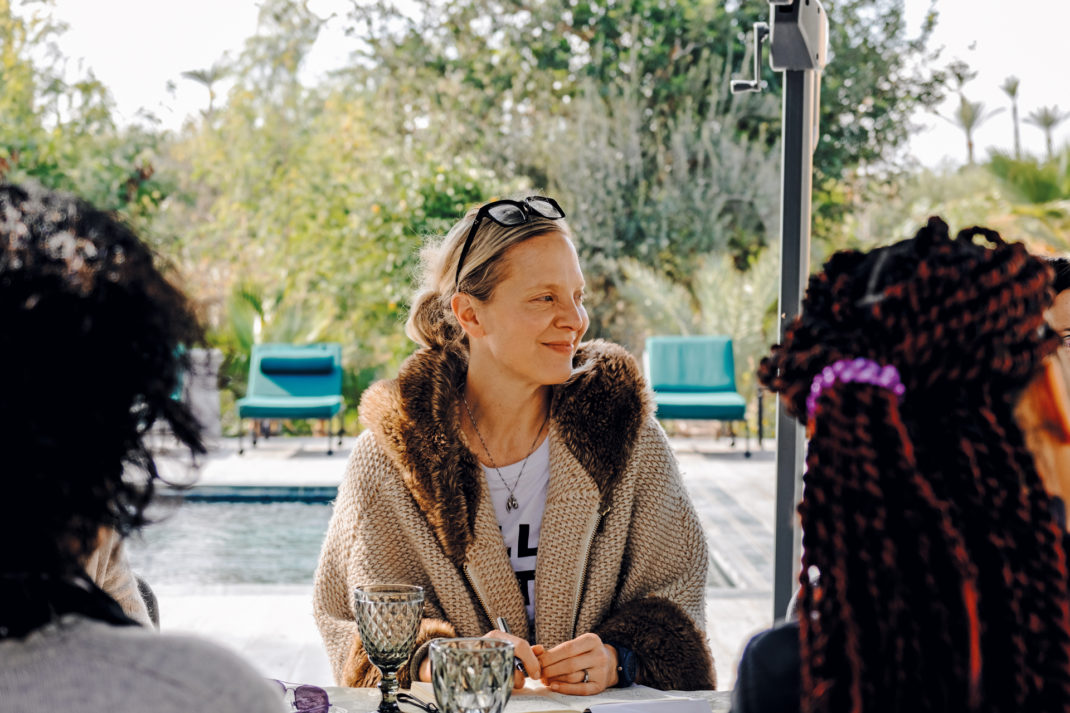‘I Went On A Writers’ Retreat In Morocco – Here’s What I Learnt’
By
6 months ago
Inside the world's top writing masterclass

Can a writers’ retreat in Morocco run by three industry heavyweights – plus a very special literary guest – make Lucy Cleland feel she has anything worth writing about?
Review: Silk Road Slippers Writers’ Retreat
‘Have you got a book in you?’ is a question I’ve always found faintly ridiculous. As if it were an alien entity lurking inside that only you – by means of some kind of alchemic mix of talent, energy and magic – could birth into being and set free upon a grateful world, hungry for your every word.
I’ve been asked it many times – after all, much of my job involves writing – and simply hedged it. The answer is: I don’t know. Obviously, I’d love to think a creative embryo was residing somewhere warm and safe in my literary uterus waiting for the seed to spark its journey to life. I fear, though, that I’m far too pragmatic and know that writing, proper writing (for me, this is literary fiction), is really, really hard work and doesn’t happen in a vacuum.
But, in a year of attempting to get out of my comfort zone, I put on my big girl pants and head to Jnane Tamsna in the sun-drenched Palmeraie, outside Marrakech, for five days of serious literary endeavour in the form of Silk Road Slippers, a writing masterclass run by three of the most formidable women in the business. (And those on the course can be pretty formidable too; in my cohort, there was a poet suffering from PTSD, a well-known British journalist, a prolifically published crime novelist, a Palestinian activist, a shadow worker and a Californian architect – you don’t have to be in the trade to be here.)
Alexandra Pringle, founding director of Virago Press and former editor-in-chief of Bloomsbury Publishing, has worked with some of the greats including Khaled Hosseini, Ann Patchett and Kamila Shamsie – and it’s her whom another of her authors and my friend, Kamin Mohammadi, says I just have to be in the presence of (mere proximity rubs off, she says).
At 72, Alexandra is still attention-grabbingly beautiful, dresses only in black with lots of jangly silver jewellery, and appears as if a glossy bird of prey, eyes bright and darting, ready to swoop in with pinpoint acuity on your work – not so much to rip it apart, but to pick out its true essence. Being truthful – which is akin to finding your voice – in your writing is a big lesson from this week. These women can spot fraudulence from 100 feet (as I learnt).
Faiza Khan, a former Bloomsbury editor (now freelance) – and writer, coach and mentor – who speaks as though singing and whose voice is sharper than the most cut-glass of colonial British accents, dishes out the prompts each day for our morning pages. One day it’s a poem; another, a picture or a postcard. This practice – journaling by another name – urges us to just write, write, write unedited and uninhibited, ridding us of the fear of the empty page (a writer’s worst nightmare). After this purge is when the more serious work can begin. Finally, Alex von Tunzelmann: historian, broadcaster and screenwriter, with purple hair and glasses that remind me of Maud in The Worst Witch. She completes the trio, who riff and ripple off each other like finely tuned instruments – complementing, not jarring. They are a marvel.
I can’t say it’s not nerve-wracking. After dinner together on the first day, we start our work each morning around a big table, under the shade of a huge carob tree in the beautiful garden of this hotel-cum-creative hub, bitter coffee and mint tea on tap. We dip between studying and commenting on passages from other authors (perhaps Esther Freud’s Hideous Kinky or Hanif Kureishi’s Intimacy), the three women drawing out of us the elements that make the work striking and teaching us how we can learn from them.
We also do our own writing exercises. The first time Alexandra tells us we have seven minutes to write a book blurb – which demands far more skill than you might think – or a first-person monologue, it’s pure panic. I’m back at school, only a pen and paper to hand while a clock ticks menacingly. But, as I overcome any self-consciousness (which you need to do pretty quickly, because you have to read out your work aloud in front of everybody – and get the three-pronged feedback), feelings begin to shift. It’s like I’m waking up a dormant muscle – the memory is still there, it’s just been neglected. Through practice, the pen and paper begin to make sense; they start to connect, and words – not always bad – tumble forth. I find this extraordinary, as I haven’t really written with a pen properly for decades – the keyboard is my tool. I didn’t even believe I could write the pages that flow out of me because my hand would be physically too weak. It’s a revelation, then, that after a few days, I have an almost full notebook of words. My words.
Like with anything, there are tricks and tips that must be learned and observed and that form the most basic rules. ‘Show, don’t tell’ is the most important, the one that is hammered home to us each session. Adjectives are loathed with a passion. And don’t ever use a pretentious word to sound brainy when a short one will do.
It seems cruel – and lazy (another literary sin) – to call them the three witches, but such is the command of their craft and their criticism that each of us receives their verbal sucker punches like they are an oracle. A well-judged phrase, a challenging question, an arch look – always delivered with kindness and grace – can have us reach inside ourselves for something fresher, more original, less hackneyed, more truthful. They’re changing the way we write with their instruction. It feels like a gift and we greedily take copious notes and rewrite, change and alter narratives accordingly.
On day two, Alan Hollinghurst sits at the head of the table to lead a session (each of the four annual masterclasses sees an appearance from a literary star: think Esther Freud, Andrew O’Hagan or Monica Ali, just to set the bar pretty high). Can you imagine anything more daunting than reading out your work in front of the legend whose book Line of Beauty was cult reading? His gentle, almost shy manner avoids any soul-destroying criticism – but in turn (and more usefully), we learn so much about his style and approach to his craft. After all, he’s a man who likes to leave a tantalisingly long pause between publications – seven years for the latest. But, for us, it was worth the wait to hear him read aloud from Our Evenings in front of the fire later that night for a deliciously intimate literary soirée.
Towards the end, we have to file a thousand words and are granted an hour’s one-on-one with one of our three teachers. Here, I was outed as a fraud. My literary voice was inauthentic, I was told candidly, in the scene I’d set on Bournemouth beach (most people here come with a project they’re already working on. I had nothing). However, on the last night, and our final writing exercise, I nailed it. Alexandra (yes, Alexandra!) told me what I’d written was ‘very accomplished’. I was lost for words – and that was enough for me.
BOOK IT:
Five-day masterclass £3,200 (not including accommodation). silkroadslippers.com
Lucy’s return flights from London Heathrow to Marrakech had a carbon footprint of 693kg of CO2 e. ecollectivecarbon.com
























